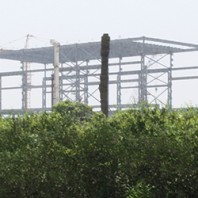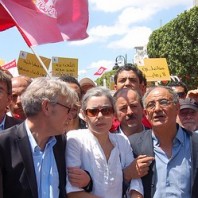Affected community members and local civil society organizations have submitted the first complaint from Egypt about a World Bank-funded project to the Bank’s highest accountability body, the Inspection Panel
On a recent visit to Washington, DC, representatives of the Tunisian General Labor Union (UGTT) met with senior officials at the World Bank including the country director for Tunisia to discuss the Bank’s involvement in the country generally and its engagement with the union particularly.
On June 26, 2012, BIC and YOHR committed to coordinating their activities related to encouraging civil society participation in World Bank activities in Yemen.
BIC outlines the World Bank’s current activities in Yemen and proposes that civil society engagement is necessary now more than ever.
The following interview highlights the work of Tunisian civil society activist Adel Beznine in the area of transparency in Tunisia.
In a meeting with Bank staff, Egyptian civil society and affected residents of North Giza farming communities raised concerns about a power project’s impacts on local livelihoods and the environment.
On June 9, 2011, Management at the World Bank submitted to the Inspection Panel three water studies it had commissioned related to the Greater Beirut Water Supply Project. In a March 2011 meeting with the Bank’s Board of Directors which took place after the Panel recommended further investigation into the potential harms of this project, the Panel agreed to wait for the results of the above-noted studies to decide whether or not an investigation of the project would still be warranted. The three studies focused on the cost, quality and availability of water associated with the project as these were identified by the Panel as the main issues warranting investigation.
On June 30, 2011, the World Bank closed the controversial West Delta project. The Bank had approved the US$145 million loan to the government of Egypt in June 2007 to build an irrigation system that would divert water from the Nile to supply modern, export-oriented farms on reclaimed desert lands areas that are severely depleted …
On March 14, 2011, the World Bank disclosed two documents related to the Inspection Panel case filed by 51 residents of the Greater Beirut area against the Greater Beirut Water Supply Project (GBWSP), a water project in Lebanon that is being financed by the Bank. The GBWSP aims to provide potable water for the citizens of the Greater Beirut area and the low-income neighborhoods of Southern Beirut from the Litani and Awali rivers.
On November 4, 2010 the World Bank’s Inspection Panel received a complaint from a Lebanese citizen representing himself and approximately 50 Beirut inhabitants who say that a World Bank water project will have negative impacts environmentally and economically. Management at the Bank has until December 13, 2010 to respond to the complaint.


